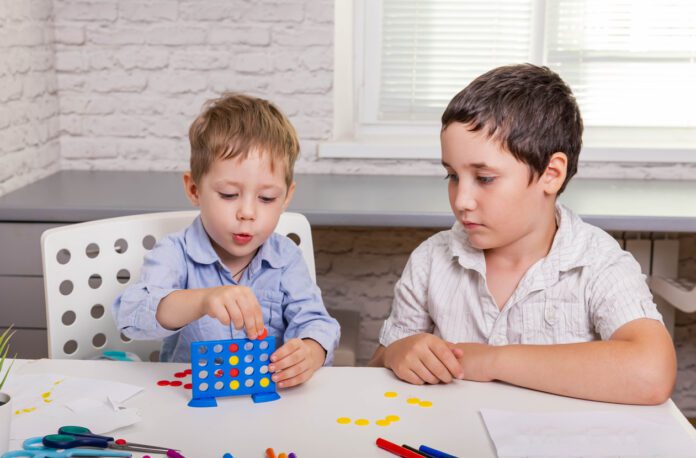
Board games have surely had their day: how can they compete with on-screen thrills?
The doubters couldn’t be more wrong! Mousetrap is the most popular children’s game right now, with someone searching for this game more than once every minute in the UK!
And (possibly Covid related??)… the biggest increase in folk searching board games is seen for that old family favourite – Operation with a whopping 124% increase.
This is according to exclusive data from educational resources supplier Hope Education on the 20 most ‘Googled’ children’s games in the run-up to Christmas.
We asked education expert and former teacher Laura Steele from PlanBee what each of these games could add to a family Christmas and how they can help learning… the answers may surprise you.
“Many parents worry about how much screen time their children rack up. While there are a plethora of entertaining and educational on-screen games, they do not always offer the same advantages that sitting down as a family and playing a board game can bring.”
So, dig some old favourites out of the cupboard and you’ll find you’ve thrown a double-six!
Out of the 20 most searched for children’s games, 95% are proven to enhance a child’s personal and social skills, while 85% are proven to improve their observation.
This is the top 10 in full:
- Mousetrap
- Snakes & Ladders
- Uno
- Scrabble
- Connect 4
- Ludo
- Cluedo
- Guess Who
- Twister
- Jenga
Not so boring after all: why board games help kids learn while they play
Former primary school teacher Laura Steele of education resource experts PlanBee explains
Brain function and cognitive development
The act of playing a game helps to awaken and exercise essential cognitive skills such as problem-solving and decision-making. For example, Connect 4 is a deceptively simple yet strategic two-player game where the aim is to get four coloured discs in a line before your opponent does. To be successful, each move has to be thought through and considered: the player has to picture different outcomes to future moves and decide whether their next one will block to their opponent’s progress or take themselves closer to winning. Games like this can help these complex thought processes develop.
Many aspects of playing a board game can also promote literacy skills, from reading instructions and game cards to speaking and listening to fellow players. Games like Scrabble, Boggle and Articulate are a great way of explicitly helping to develop literacy skills such as spelling, improving vocabulary and oral description.
Other board games can help to develop numeracy skills: a good example is Monopoly. As well as practising their counting, adding, subtracting and multiplying skills, children also need to be constantly aware of how much money they have, and make decisions on how, when and if to spend it. Although there is a fair amount of luck involved, tactical thinking can often be to a player’s advantage. Older children may even begin to assess the probability of various outcomes and whether risks can be taken due to these assessments.
In addition to cognitive development, many games can also help children to practise and refine their fine motor skills. A certain level of hand-eye coordination and dexterity are required to move pieces around a board. Try old favourites like Operation, Buckaroo and Jenga to help children to develop these skills.
Playing a board game can take time and concentration, and can help to increase a child’s attention span.
Social and emotional skills
Playing a board game almost always requires a minimum of two players. This sets the scene for the development of a wide range of social skills such as patience, turn-taking, sharing, compromising, and collaborating in team games. Games can also help older children to develop their understanding of another person’s viewpoint – they may need to put themselves into their opponent’s shoes to anticipate their moves.
Many children find losing, or being unsuccessful, difficult to cope with. Board games can be a safe activity to ‘fail’ at, and offer children an opportunity to learn how to deal with this feeling. An adult’s input is often useful here – not only to express that it is OK to lose but also, if appropriate, to discuss what went wrong and look at alternative strategies together. Playing games where there is a ‘winner’ and a ‘loser’ can help children to develop resilience – the ability to pick themselves up and try again if things haven’t gone the way they wanted them to.
Family time
Many parents worry about how much screen time their children rack up. While there are a plethora of entertaining and educational on-screen games, they do not always offer the same advantages that sitting down as a family and playing a board game can bring.
In an attempt to try to reduce their child’s screen time, parents may be looking to their own childhood and have fond memories of these classic games, which they would now like to experience with their children. No wonder there’s been an increase in Google searches for classics such as Mousetrap and Connect 4.
What does the data reveal?
According to this data, Snakes & Ladders and Uno receive a combined 70,000 Google searches a month – just under 100 searches an hour on average. Scrabble and Connect 4 complete the top 5 list of most searched for children’s games, with 35,000 and 27,000 monthly searches respectively.
Over the last three months, searches for Mousetrap have increased by 50%, while the games with the biggest increase in searches are Operation (124%) and We’re Going On A Bear Hunt (83%).
Help keep news FREE for our readers
Supporting your local community newspaper/online news outlet is crucial now more than ever. If you believe in independent journalism, then consider making a valuable contribution by making a one-time or monthly donation. We operate in rural areas where providing unbiased news can be challenging. Read More About Supporting The West Wales Chronicle






















